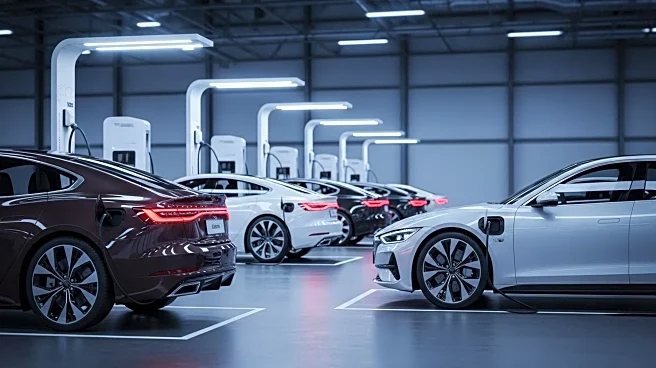What is the story about?
What's Happening?
Hyundai has announced a comprehensive growth strategy focused on expanding its electric vehicle (EV) lineup and increasing production capabilities. During its first CEO Investor Day outside of Korea, held in New York, Hyundai revealed plans to introduce a range of new EVs, hybrids, and an extended-range electric vehicle (EREV) by 2027. The EREV is expected to offer over 600 miles of range using a gas-powered engine to extend its reach. Hyundai aims to sell 5.55 million vehicles globally by 2030, with 3.3 million being electrified models. The company is also set to launch its first midsize pickup in North America and expand its luxury Genesis brand with new hybrids and EREVs. Additionally, Hyundai plans to ramp up production at its Metaplant America EV plant in Georgia, creating 3,000 new jobs and increasing its U.S. supply chain sourcing.
Why It's Important?
Hyundai's aggressive expansion into the EV market signifies a major shift in the automotive industry towards electrification. By increasing its production capacity and introducing a diverse range of vehicles, Hyundai is positioning itself as a leader in the transition to sustainable transportation. This move is likely to have significant implications for the U.S. automotive market, potentially boosting local economies through job creation and increased manufacturing. The focus on domestic production aligns with broader industry trends towards localizing supply chains, which could enhance economic resilience. Hyundai's strategy also reflects growing consumer demand for environmentally friendly vehicles, which could accelerate the adoption of EVs in the U.S. and globally.
What's Next?
Hyundai's plans to increase production and introduce new models will likely prompt responses from competitors, potentially leading to further innovations and investments in the EV sector. The company's commitment to expanding its U.S. operations may influence other automakers to enhance their domestic production capabilities. As Hyundai rolls out its new models, consumer reception and market performance will be critical in determining the success of its strategy. Additionally, regulatory developments and government incentives for EVs could impact Hyundai's plans and the broader market dynamics.















